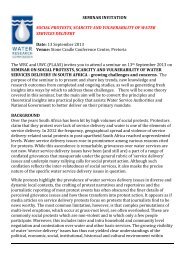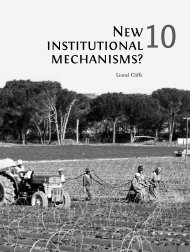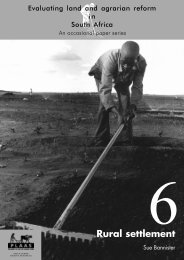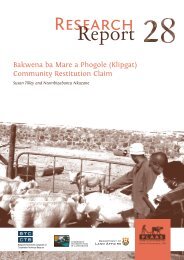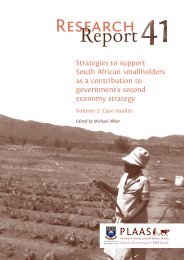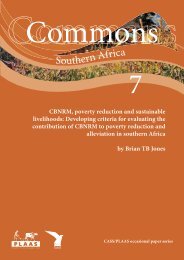A critical appraisal of South Africa's market-based land reform policy
A critical appraisal of South Africa's market-based land reform policy
A critical appraisal of South Africa's market-based land reform policy
You also want an ePaper? Increase the reach of your titles
YUMPU automatically turns print PDFs into web optimized ePapers that Google loves.
Chapter 5: The LRAD programme<br />
According to the <strong>policy</strong> (DLA 2001; NDA<br />
2001) the process <strong>of</strong> accessing LRAD<br />
grants starts with beneficiaries who may<br />
apply as individuals or as a group. Beneficiaries<br />
are expected to decide on the size<br />
<strong>of</strong> grant they would like, identify <strong>land</strong>,<br />
develop a business plan, show pro<strong>of</strong> <strong>of</strong><br />
their own investment in the project, and<br />
submit all <strong>of</strong> this to the PGC. A project also<br />
has to have the endorsement <strong>of</strong> the local<br />
DoA <strong>of</strong>fice regarding the feasibility <strong>of</strong> the<br />
plan and a confirmation from a pr<strong>of</strong>essional<br />
valuer that the <strong>land</strong> price is reasonable.<br />
The beneficiaries may choose to ask a<br />
design agent to assist them in any <strong>of</strong> the<br />
tasks or they may prepare the proposal<br />
themselves. On seeing that an applicant<br />
needs assistance, DLA may also appoint<br />
design agents and valuers to assist, and<br />
such costs may be paid from the planning<br />
grant. Once approved, DLA appoints a<br />
conveyancer, organises any subdivision <strong>of</strong><br />
<strong>land</strong> that may be required, and releases the<br />
money. The relevant DoA should then<br />
appoint a ‘mentor/extension <strong>of</strong>ficer’ to<br />
provide support and organise training for<br />
the project (NDA 2001:4).<br />
According to the <strong>of</strong>ficials we<br />
interviewed, projects are allocated to a<br />
specific district project <strong>of</strong>ficer who refers<br />
the application to the PGC when it is ready.<br />
Applicants are assisted to check that the<br />
application forms are complete. If applicants<br />
have not identified a particular farm<br />
for the project, they are assisted to do so.<br />
DLA checks with the Regional Land Claims<br />
Commission (RLCC) to ensure the targeted<br />
<strong>land</strong> is not subject to a <strong>land</strong> claim. Applicants<br />
are interviewed to make sure they<br />
know what they are embarking on and to<br />
inform them about how LRAD and the<br />
application process works. Project <strong>of</strong>ficers<br />
continue interacting with applicants until<br />
they have all the information needed to<br />
process the application.<br />
When reviewing a project application<br />
the PGC may approve the application,<br />
reject the application, or return it to the<br />
applicant for further information (DLA<br />
2001:11). Some potential reasons that<br />
<strong>of</strong>ficials gave for rejecting applications<br />
were that the <strong>land</strong> is not suitable or <strong>of</strong><br />
sufficient size for the intended use, the<br />
<strong>land</strong> is overpriced, or the applicant has<br />
already received other <strong>land</strong>-related grants<br />
(interviews 1, 2 and 3). Alternatives for<br />
those whose applications have been<br />
rejected include applying for access to<br />
municipal commonage or the lease <strong>of</strong> a<br />
government farm. At the time <strong>of</strong> writing,<br />
no municipal commonage projects had<br />
been implemented in Limpopo (interviews<br />
1 and 3). Another approach is for the DLA<br />
project <strong>of</strong>ficer to adjust the proposal to try<br />
and make the project more viable. One<br />
option is to arrange a Land Bank loan to<br />
ensure sufficient investment for the project<br />
to succeed. However there was concern<br />
that this could lead to the Land Bank<br />
repossessing <strong>land</strong> if beneficiaries failed to<br />
repay their loans (interview 2).<br />
While there is a clear target for the<br />
extent to which women should access<br />
<strong>land</strong>, there is little indication in the <strong>policy</strong><br />
documents as to the measures that should<br />
be used to ensure this takes place. The<br />
<strong>policy</strong> document, apart from recommending<br />
the encouragement <strong>of</strong> women-only<br />
projects, simply highlights basic principles<br />
such as pointing out that ‘women can<br />
apply for grants to acquire <strong>land</strong> individually’<br />
and <strong>of</strong>ficials ‘must ensure that<br />
women are able to participate on an equal<br />
footing with men’ in the implementation <strong>of</strong><br />
LRAD (DLA 2001:6–7). According to the<br />
<strong>of</strong>ficials we interviewed, women who do<br />
participate are treated the same as men and<br />
become <strong>land</strong>owners in their own names, as<br />
opposed to the situation in communal<br />
areas and in some <strong>of</strong> the earlier SLAG<br />
projects where <strong>land</strong> is <strong>of</strong>ten registered in<br />
the name <strong>of</strong> a male household head. It was<br />
acknowledged that the DoA does not have<br />
any specific programme to involve women<br />
(interview 4). DLA <strong>of</strong>ficials try to promote<br />
women’s participation through specifically<br />
encouraging them to apply, explaining that<br />
women are meant to benefit from the<br />
programme, and dividing men from<br />
women in meetings to give women an<br />
opportunity to talk without men being<br />
present (interviews 1, 2 and 3).<br />
21




